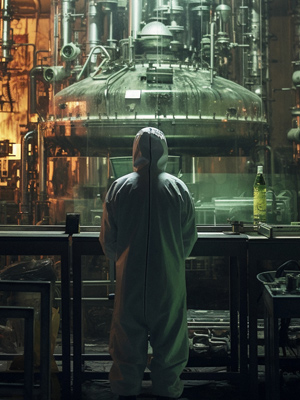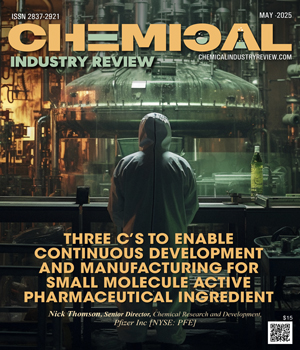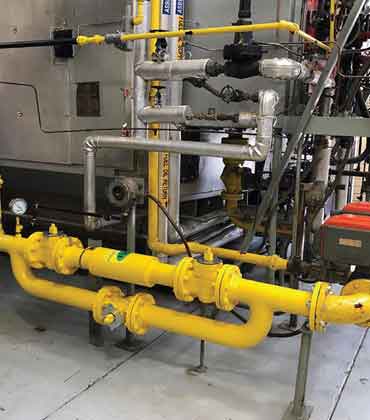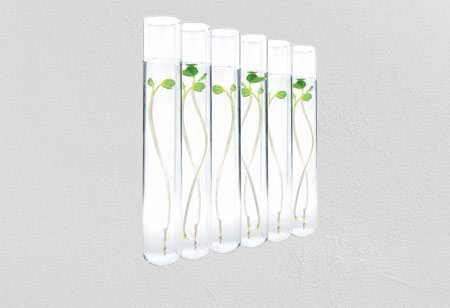Thank you for Subscribing to Chemical Industry Review Weekly Brief
Chemical Industry Review: Specials Magazine
Three C's To Enable Continuous Development And Manufacturing For Small Molecule Active Pharmaceutica
Nick Thomson joined Pfizer in 1997 as a process chemist in Sandwich, UK. Nick spent his early Pfizer career in the evolving process chemistry departments in Sandwich (UK), Sittingbourne (UK) and Holland, Michigan (USA). From 2005 to 2010, Nick led the Sandwich Research Active Pharmaceutical Ingredient (API) department, with accountability for delivery of API technology from lead development to proof of concept. In 2011, Nick joined the Pfizer Chemical Research and Development department in Groton, Connecticut (USA), with accountability for the Quality by Design development and submission of late stage candidates. In 2014, Nick became head of the Technology API line for Pfizer Chemical Research and Development, and has held accountability for Technology Strategy, High Throughput Screening, Biocatalysis, Pressure Labs, Computational Chemistry, and Flexible API Supply Technologies. Nick has been active in cross pharmaceutical precompetitive collaboration, as Chair of the IQ API Leadership
Fuel Catalyst Manufacturer 2025
Two influential factors significantly impact businesses across all industrial sectors. First, the persistent high cost of fuel substantially challenges financial profitability, necessitating resource optimization and cost reduction. Second, pollution presents a dual threat, encompassing ecological and financial implications that reverberate through industries. At this juncture of economic burden and environmental consciousness, a transformative force emerges—the Fitch Fuel Catalyst by Advanced Power Systems International, Inc. (APSI). The catalyst is a heterogeneous metallic alloy (HMAC) that, when in use, reformulates the molecular composition of fuel at ambient temperatures and pressures. It is a true catalyst, setting a new standard for enhancing fuel efficiency and reducing emissions. “The Fitch Fuel Catalyst possesses a distinct capability to reformulate gasoline, diesel, fuel oil, propane, and natural gas. This innovation unlocks latent energy potential within fuels, delivering reduced fuel consumption or heightened production and performance, increased horsepower, and torque, to customers,” says Win Fitzpatrick, President of APSI. A remarkable aspect of the Fitch Fuel Catalyst is its substantial influence on emissions. Promoting more complete combustion reduces harmful emissions, including greenhouse gases, polyaromatic hydrocarbons, particulates, and soot.
Immersion Mills & Dispersion Equipment Manufacturer 2025
What are the key considerations when procuring equipment for particle processing to meet industrial demands? Do you prioritize equipment efficiency, reliability, consistency, quality or durability? Hockmeyer has it all. Over a long-standing reputation of 80 years, Hockmeyer has established itself as a leader in Immersion milling and dispersion technology. It provides custom-designed processing equipment for mixing, blending, dispersing and particle size reduction. The equipment is recommended after a thorough assessment. A discussion between its R&D and processing experts and the clients allows Hockmeyer to understand their current processes and challenges in obtaining product specifications. Based on these insights, it formulates relevant recommendations. The company also proposes an attended trial at its testing facility, which allows it to assess the material firsthand, understand its behavior, determine the required horsepower and ascertain its rheology properties. This ensures precise design and customization of the equipment to meet client needs. Hockmeyer’s custom-designed equipment is used for developing inks, paints & coatings, adhesives, personal care products, renewable energy materials, and agrochemicals, to name a few. Material assessment and formulation verification improve the transition from laboratory to large-scale production. The company prioritizes flexibility in equipment development for a seamless transition from laboratory to production sizes. The equipment is designed to easily adjust according to batch sizes and accommodate changes in dimensions or incorporate vacuum operations, providing versatile solutions for diverse needs. This approach enables clients to optimize formulations and processes, reducing risks and enhancing product quality throughout the production lifecycle. Driving Efficiency through Streamlined Nano-Particle Processing Efficiency is paramount in particle processing, especially when dealing with nanometer-sized particles. Hockmeyer, recognizing the challenge, has made efficiency its hallmark. The research and development laboratory conducts extensive trials, adapting formulations for nano-sized particles to ensure peak performance and linear scalability with remarkable precision at a small scale. Hockmeyer’s mills demonstrate proficiency in handling media from 3mm down to 0.03mm. The equipment leverages high flow rates facilitated by maximizing the open surface areas of screens. The Inline Nexgen™ vacuum recirculation mill operates at high tip speeds and high flow rates, achieving tight particle distributions rapidly in recirculation mode, surpassing conventional horizontal mills.
Wood Preservative Supplier 2025
While many pest control companies and manufacturers strive to provide effective solutions for insect infestations and rodent invasions, success at Nisus Corporation is driven by more than just products. It’s rooted in the deep expertise of the highly credentialed team and a commitment to a collaborative, customer-focused work culture. The company’s specialists bring years of experience in their respective fields, ensuring they not only understand the technical aspects of pest control but also excel at working closely with customers to solve their distinct challenges. By fostering a culture of team-driven innovation and prioritizing public health, Nisus consistently achieves customer satisfaction and meets business objectives. “We believe that people are our greatest asset, and we are committed to creating a collaborative and healthy culture for our employees. We also prioritize supporting our communities, including the region in which we work and our industry as a whole. We want to be a pillar of support for pest professionals in the field,” says Lee Barrett, president of Nisus Corporation. Nisus is a privately-held chemical manufacturing company that offers sustainable borate and other active ingredient products for the professional pest control, industrial wood protection, and agricultural liquid micronutrient industries. The word ‘nisus’ essentially means a perfecting urge, an irresistible impulse to keep driving toward a goal. The company’s aim is to put that ethos to work, developing products that outperform existing solutions while offering a superior environmental profile. The Key to Success: Skilled Teams and Strong Culture The top priority for Nisus Corporation is placing skilled individuals in roles that match their expertise, sometimes in surprising ways. The company’s success is driven by the quality of individuals within the organization and the strong company culture it has cultivated. Barrett strives to empower his team by maintaining transparency in communication to ensure everyone is aligned and informed while fostering an open dialogue that brings individual expertise to the forefront. Advanced Borate Products for Pest Management The experience and expertise of the Nisus team allow them to work with clients to combat increasing termite pressure by providing flexible and effective solutions like Bora-Care®, Tim-bor®, and Penashield®. These products harness the power of borates to defend untreated lumber and other materials from threats posed by wood-destroying organisms such as termites, carpenter ants, or even decay fungi. Borates work by killing the microorganisms in the digestive tracts of insects like termites, preventing them from breaking down wood cellulose and effectively causing them to starve. This gut-destroying mechanism of borates is effective in controlling ants, cockroaches, crickets, and silverfish, among other listed pests.
CXO INSIGHTS

Evolution of The Chemical Industry
David Bem, CTO, SVP Science and Technology, PPG

Plastics Lighten the Load and Increase Sustainability in the Transportation Industry
Melissa Cohen, Vice President, Supply Chain and Procurement, INEOS Styrolution America

Best Practices For Reducing The Carbon Footprint In A Turnaround
Walter Pesenti, Vice President, Manufacturing Excellence, NOVA Chemicals

Elevating Supply Chain Excellence
Julie McAlindon, Senior Vice President, Regions and Chief Supply Chain Officer, Eastman

The New Frontier of Sustainability
Paul Bonnett, Senior Director of Agronomy & Environmental Sciences (AES), Nutrien
IN FOCUS
The Role of Catalyst Solutions in Revolutionizing Efficiency in Chemical Industrial Processes
Catalyst solutions are, therefore, a pre-condition for effectiveness and sustainability in the chemical industrial process.
Growth Factors Driving the Chemical Consultants Market
Chemical consultants play a crucial role in the industry by providing services in process optimization, regulatory compliance, research, market analysis, and strategic planning.
EDITORIAL
Low-Carbon Production: Shaping the Future of US Chemicals
A renewed emphasis on sustainability and carbon reduction is propelling the US chemical industry into a new age. Chemical firms are making significant investments in lowcarbon technology and processes to ensure a competitive future as state and federal regulations tighten emissions objectives and consumers want greener products. Major companies today are moving toward renewable feedstocks, electrifying chemical processes, and increasing carbon capture and storage (CCS). Innovations in bio-based materials, green hydrogen, and circular production methods are gaining popularity quickly and provide opportunities to drastically reduce emissions without compromising efficiency or profitability. Advanced manufacturing is also playing a crucial role. Digital technologies such as AI, machine learning, and predictive analytics are optimizing energy use, improving yields, and reducing waste. Smart chemical plants are no longer a vision, they are becoming a reality, helping companies meet both economic and environmental goals. Still, challenges remain. Scaling new technologies demands significant capital, and regulatory clarity is essential to accelerate investment. Building the necessary renewable energy infrastructure to support low-carbon chemical production is another pressing need. Strong collaboration across industry, government, and research institutions will be critical to overcome these hurdles. The momentum is clear and growing. New projects are being announced across the United States, from green ammonia plants to circular plastics facilities. The Inflation Reduction Act and other incentive programs are providing additional tailwinds, encouraging faster innovation and deployment. The US chemical sector is not just adapting to a low-carbon future, it is actively building it. With strategic investments, technological leadership, and a commitment to sustainability, the industry is poised to redefine what responsible manufacturing looks like on a global stage.













